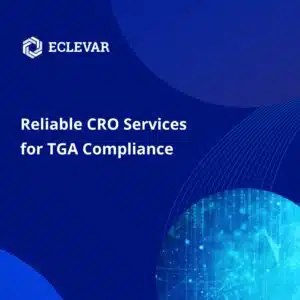What are some reliable CRO services available for ensuring TGA compliance of medical devices?
Australia’s Therapeutic Goods Administration sets a series of indications for regulatory compliance. The agency is responsible for ensuring quality and safety for medical and therapeutic products set for market inside the country, including medical devices. For a successful approval, is important to understand how to obtain Medical Device TGA Compliance.
Manufacturers must submit an application to the TGA for assessment and approval. This process includes a thoroughly examination of the technical documentation and clinical evidence to help safeguard patients and healthcare providers
As an experienced CRO, ECLEVAR is ready to assist you at the regulative development for Australia, we offer you complete research and documentation services that fit your necessities. Keep reading to understand the device’s categoric classification and obtain an overview for the approach of regulations in complete Medical Device TGA Compliance.
TGA compliance for the medical device industry
The Therapeutic Goods Administration is the regulatory body responsible for the assessment and monitoring of therapeutic products in Australia. Much like FDA (in the United States) or EMA (Europe), it operates under the Department of Health and plays a crucial role in certifying the safety, efficacy, and quality of medicines, devices, and other healthcare products available in Australia.
TGA closely monitors the market to identify and address any potential issues, providing accurate information to healthcare professionals and the public. This involves a rigorous process where the administration reviews scientific data and evidence provided by manufacturers to make sure that the products meet the required standards.
After a medical product enter the country, TGA conducts post-market surveillance activities to analyse the performance, taking appropriate actions if any issues arise.
Categorization of Medical Devices
The TGA categorizes devices into different risk classes based on their potential harm to patients:
- Class I: lowest risk
- Class Is, Class Im: low
- Class IIa: low to moderate
- Class IIb: moderate to high
- Class III: high risk
High-risk devices, such as implantable or life-supporting equipment, require a more intensive evaluation process that may involve a review of clinical data or involvement of expert advisory committees. For lower-risk devices, manufacturers may rely on conformity assessment procedures recognized by the TGA to demonstrate compliance with the necessary requirements.
Regulations and requirements
Documentation holds a great importance in the policing of medical technologies and in vitro diagnostic (IVD), that’s why TGA has established guidelines that layout the necessary documents when applying for approval.
Compliance with TGA regulations heavily relies on the writing of comprehensive, accurate, and complete documentation throughout the entire life cycle of the device. Establishing fidelity to these documentation requirements is crucial for market approval, as it demonstrates commitment to meeting regulatory standards and facilitates the evaluation process.
Sponsors seeking to register their devices in the ARTG (Australian Register of Therapeutic Goods) may need to provide a diverse set of documents, depending on the specific circumstances. To initiate a valid application, sponsors may need to submit documents such as:
- device specifications
- quality control information
- clinical evidence
- conformity assessment certificates
During the application audit, additional documents may be requested for review, including manufacturing records, labelling information, and post-market surveillance plans. Once the device is included in the Register, sponsors have ongoing responsibilities, such as providing updates on adverse events, variations to the device or its labelling, and periodic safety reports.
By meeting these documentation requirements, sponsors can ensure Medical Device TGA Compliance and maintain the integrity for the benefit of patient security and public health.
The TGA also applies a risk management approach to the regulation of:
- In vitro diagnostic medical devices (IVDs)
- blood
- blood components
- plasma derivatives
- tissue and cellular products
- tissue and cell based derivatives
- sterilant and disinfectants
ECLEVAR – A Expert CRO Support for Medical Device TGA Compliance
Based in France, ECLEVAR MEDTECH is a global Contract Research Organization (CRO) that specializes in assisting medical device and in vitro diagnostic (IVD) manufacturers with the transition to market.
Our comprehensive range of services includes clinical evaluation reports, premarket clinical trials, Post-Market Clinical Follow-up studies, as well as the collection and utilization of real-life data and real-world evidence to support regulatory submissions.
With offices in Europe, the United Kingdom, and Australia, we have the capability to conduct international multi-site clinical trials while providing local support to our clients. Contact us to work alongside experts for Medical Device TGA Compliance and move your product forward.

